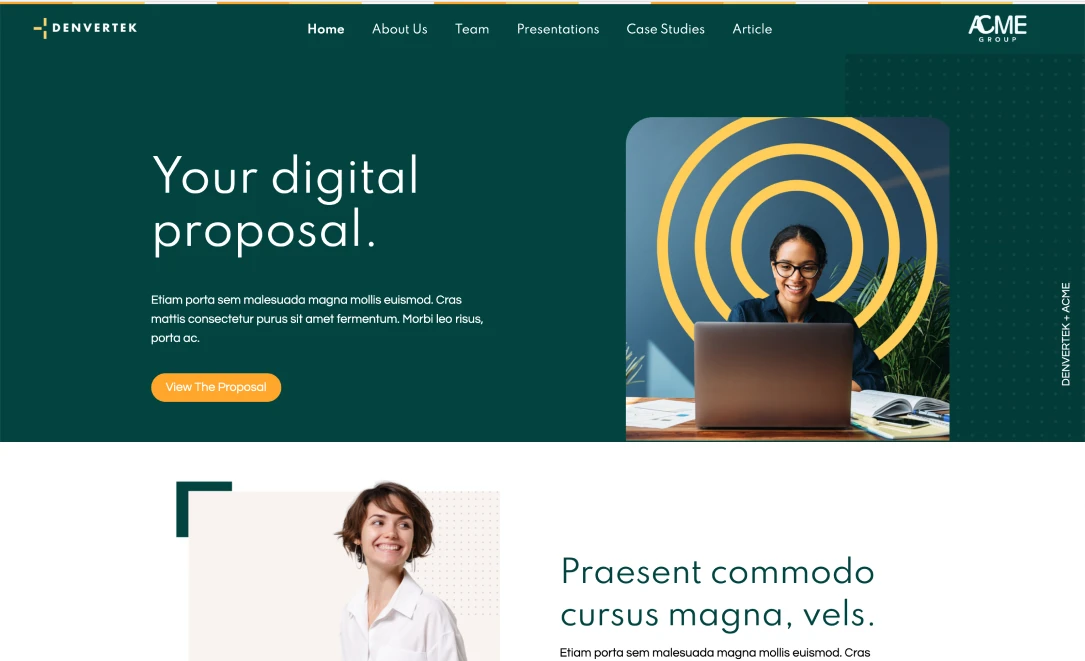If you are thinking about purchasing an interactive content platform (sometimes known as a content experience platform) for your organization then it’s important to choose wisely.
If you’re using this tool to send bid responses, after all, it’s going to be storing a lot of important and commercially sensitive data. Security, performance, and pricing are all going to be paramount concerns.
Here’s a checklist that you can use to assist during the evaluation process.
1. Platform security
Perhaps the first thing on your purchasing evaluation list for your interactive content platform should be the security and integrity of your data. That depends heavily upon where it’s being stored. Some important questions to ask would be:
- Who is the CMS using to host their data with? Is it a trusted cloud provider or are they hosting the application themselves, on their own infrastructure? If the latter — what infrastructure are they using?
- What encryption standard is being used?
- Does the company have a track record of securely hosting other sites?
Most content management solutions are offered through a software as a service (SaaS) model. This means that you are renting access to the software which is being hosted on infrastructure managed by the company — so all you have to worry about is paying a subscription and logging in through the internet.
Usually, in order to provide this, the company is actually renting server space from a dedicated infrastructure provider — such as AWS, Google Cloud Platform, or Microsoft Azure. Sometimes, though, SaaS companies operate their own infrastructure. Knowing these details might seem like getting stuck in the technical weeds, but is important to helping your security team evaluate whether the platform is secure and trustworthy enough to use for hosting business critical data.
Zoomforth hosts customer data with Amazon Web Services (AWS). AWS is considered one of the most secure infrastructure platforms in the world — and it’s one of the most widely used. It’s so secure, in fact, that the US intelligence community trusts it to host its data. Zoomforth uses Transport Layer Security (TLS) to encrypt data to and from its servers.
2. Content platform uptime
In addition to making sure that your content experience platform is hosted on a reliable and trustworthy provider, it’s important to evaluate the host’s uptime performance. Uptime is the percentage of time during which the platform is available. Things like service interruptions and hardware failures can cause downtime — which could mean that your website is off the internet.
Questions to ask include:
- What has the host’s uptime been over the past 12 months?
- Does the host guarantee an uptime percentage?
Zoomforth’s interactive content platform has experienced 100% uptime over the past 12 months and guarantees 99.9% uptime. As Zoomforth’s architecture is built on AWS, even when we’re updating and maintaining the website your sites remain fully accessible.
 It’s important to only invest in services you can rely on. In the age of remote comunication, uptime is a vital aspect of reliability.
It’s important to only invest in services you can rely on. In the age of remote comunication, uptime is a vital aspect of reliability.
3. Business Continuity Management (BCM)
If you’re evaluating a technology partner that is going to become a critical part of your business operations then you’re creating a business dependency in your day to day operations. If your business has a business continuity and disaster recovery plan, then you need to make sure that your technology partner’s plan for disaster recovery is congruous with your objectives, including your recovery point objective (RPO) and recovery time objective (RTO).
Ask:
- What is your prospective partner’s RTO (how long business systems are unavailable before they declare a disaster and begin a restore process)?
- What is your prospective partner’s RPO (how much data loss is acceptable before a recovery process will be initiated)?
- What disasters the firm has planned for? These should include natural disasters such as pandemics as well as cybercrime and human error.
Backups and disaster recovery plans need to be tested in order to be effective. Ask your prospective technology partner how often they test theirs — and don’t be afraid to ask for proof. Zoomforth is happy to share details of its disaster recovery plans and risk assessments.
4. Auditing
After asking “what is a microsite platform?” and finding your best pick, it’s also a good idea to ask whether the technology partner you are thinking about working with subjects themselves to regular audits. Ideally, audits should be conducted to a recognized standard such as SOC 2 or ISO 9001.
Because many auditing standards are internationally recognized, this allows you to compare providers based in different countries.
Zoomforth’s interactive content experience platform is audited annually against the SOC2 standards. Copies of its latest audits are available upon request.
5. Pricing
As great as your prospective content engagement platform partner might be, it’s not going to be much use to your business if it’s outside your budget.
Before including or ruling out a solution for consideration:
- Check that there are no hidden costs
- Ask for a quotation that covers a variety of potential pricing models
When evaluating pricing, ask whether the per-seat charge covers everything required to operate the service. Are there charges for the traffic you receive, provisioning the infrastructure necessary to deploy your sites, new features or even the number of sites you create?
Zoomforth charges a flat annual seat price, per user, which includes everything needed to use the platform including unlimited sites, visitors, and storage.
6. Support
Support isn’t just required when something goes wrong. Proactive customer support focuses as much on the onboarding phase as it does upon issue resolution and troubleshooting. If you’re looking at hosting your content experiences on a third party platform, it’s worth asking whether the company is prepared to allocate support resources towards ensuring that you enjoy a successful onboarding.
Other questions you might want to ask include:
- What support methods will the company be contactable through? Can you reach them through email? Live chat? The phone?
- What are the support hours? And in what time zone is the company based?
- Will you have an account manager or dedicated point of contact?
Zoomforth offers custom training sessions on its interactive content platform by video call, a personalized onboarding program for every signup, and custom templates to help your team get up to speed fast.
7. References
Your potential partner of choice has great things to say about themselves. But does anybody else?
It’s important to ask what other firms are using the platform you’re thinking about signing up for and asking if you can speak to their users. Firsthand recommendations and references can put your mind at ease — and convince you that the platform is as good as it says it is! Zoomforth can provide references upon request.
Better content experiences await
Create interactive, trackable and secure sales proposals with Zoomforth.



